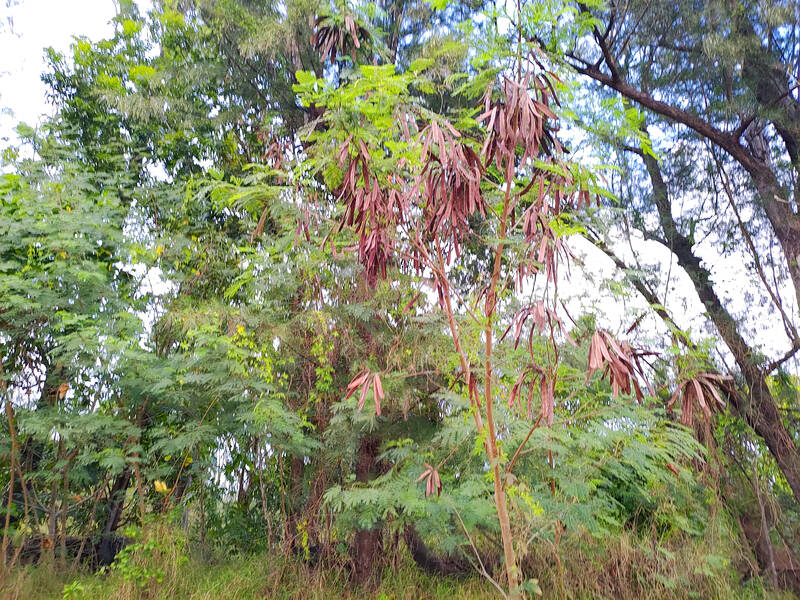Taiwan Agricultural Chemicals and Toxic Substances Research Institute has established new criteria for designating invasive plants that pose a high level of threat to the environment.
The institute is responsible for helping customs officials identify seeds included in imported materials, an essential task in the nation’s effort to stop invasive plants at the border, institute Director-General Chang Ruey-jang (張瑞璋) told a news conference in Taipei on Wednesday.
Seeds that do not originate from indigenous plants and are not approved for importation must be destroyed lest invasive plants spread in the country, he said, adding that the eradication of bitter vines alone costs taxpayers millions of new Taiwan dollars annually.

Photo: Lee Meng-fa, Taipei Times
The introduction of muhly grass by agritourism farms in Nantou County last year — which briefly became a selfie hotspot — almost triggered a full-blown environmental catastrophe in Taiwan proper, he said.
The institute is also focused on containing the spread of smooth cordgrass, which has laid claim to swathes of the Kinmen archipelago and the coastline of Taichung, he said.
As the best way to prevent the spread of invasive species is to prevent them from getting into the country, a standard for assessing the threat level needed to be established, institute assistant researcher Wang Chih-ping (王智屏) said.
The institute has thus devised an assessment protocol that assigns a numerical value for the threat posed by a plant species based on its potential for wilding, propagation, environmental impact and the feasibility of countermeasures, she said.
Wilding potential is linked to a plant’s lifecycle, prolificity and adaptability to the environment, while propagation relates to its ability to spread from an area, resilience to insects and other limiting factors, she said.
Impact analysis is concerned with a plant’s negative effects on biodiversity, economic activity and public health, while the feasibility of containment weighs the cost and effectiveness of mechanical, chemical and biological countermeasures, she said.
Nearly 40 percent of the samples found at customs included seeds of high-threat species, the institute said, adding that Taiwan’s low-to-medium altitude regions are rife with invasive plants.

A year-long renovation of Taipei’s Bangka Park (艋舺公園) began yesterday, as city workers fenced off the site and cleared out belongings left by homeless residents who had been living there. Despite protests from displaced residents, a city official defended the government’s relocation efforts, saying transitional housing has been offered. The renovation of the park in Taipei’s Wanhua District (萬華), near Longshan Temple (龍山寺), began at 9am yesterday, as about 20 homeless people packed their belongings and left after being asked to move by city personnel. Among them was a 90-year-old woman surnamed Wang (王), who last week said that she had no plans

TO BE APPEALED: The environment ministry said coal reduction goals had to be reached within two months, which was against the principle of legitimate expectation The Taipei High Administrative Court on Thursday ruled in favor of the Taichung Environmental Protection Bureau in its administrative litigation against the Ministry of Environment for the rescission of a NT$18 million fine (US$609,570) imposed by the bureau on the Taichung Power Plant in 2019 for alleged excess coal power generation. The bureau in November 2019 revised what it said was a “slip of the pen” in the text of the operating permit granted to the plant — which is run by Taiwan Power Co (Taipower) — in October 2017. The permit originally read: “reduce coal use by 40 percent from Jan.

China might accelerate its strategic actions toward Taiwan, the South China Sea and across the first island chain, after the US officially entered a military conflict with Iran, as Beijing would perceive Washington as incapable of fighting a two-front war, a military expert said yesterday. The US’ ongoing conflict with Iran is not merely an act of retaliation or a “delaying tactic,” but a strategic military campaign aimed at dismantling Tehran’s nuclear capabilities and reshaping the regional order in the Middle East, said National Defense University distinguished adjunct lecturer Holmes Liao (廖宏祥), former McDonnell Douglas Aerospace representative in Taiwan. If

‘SPEY’ REACTION: Beijing said its Eastern Theater Command ‘organized troops to monitor and guard the entire process’ of a Taiwan Strait transit China sent 74 warplanes toward Taiwan between late Thursday and early yesterday, 61 of which crossed the median line in the Taiwan Strait. It was not clear why so many planes were scrambled, said the Ministry of National Defense, which tabulated the flights. The aircraft were sent in two separate tranches, the ministry said. The Ministry of Foreign Affairs on Thursday “confirmed and welcomed” a transit by the British Royal Navy’s HMS Spey, a River-class offshore patrol vessel, through the Taiwan Strait a day earlier. The ship’s transit “once again [reaffirmed the Strait’s] status as international waters,” the foreign ministry said. “Such transits by